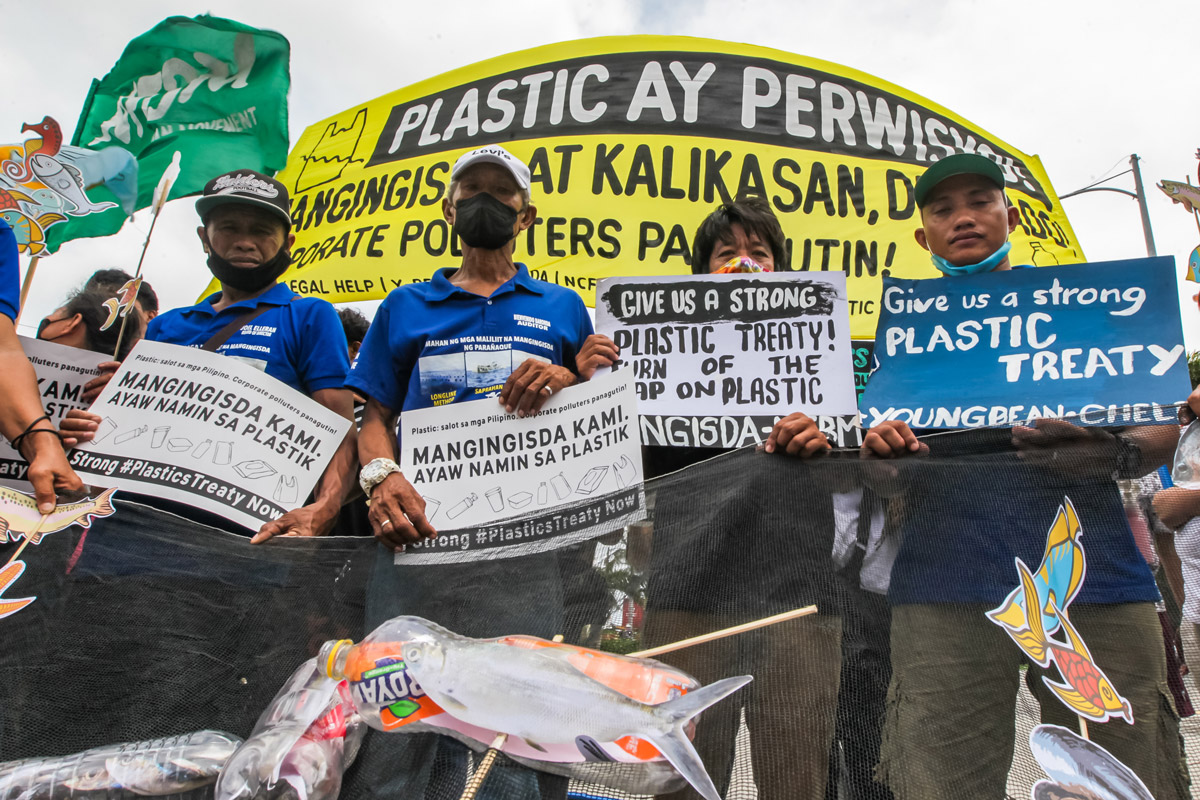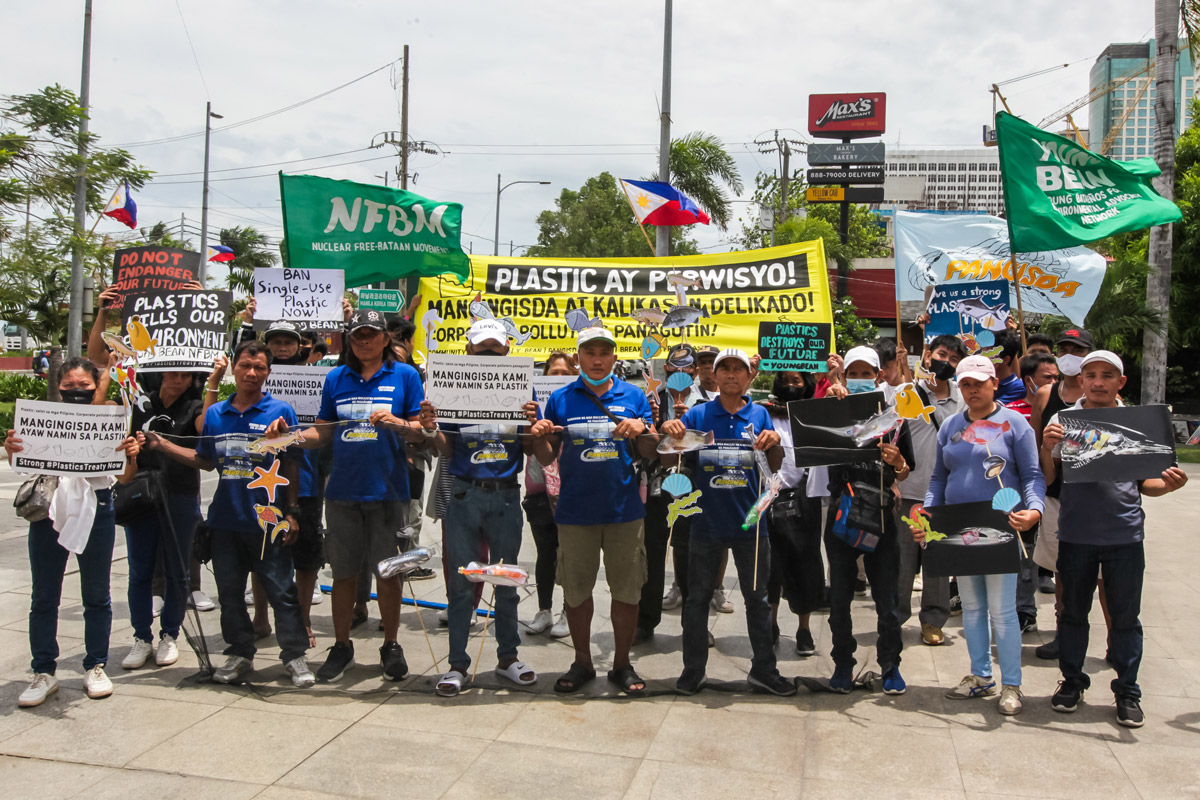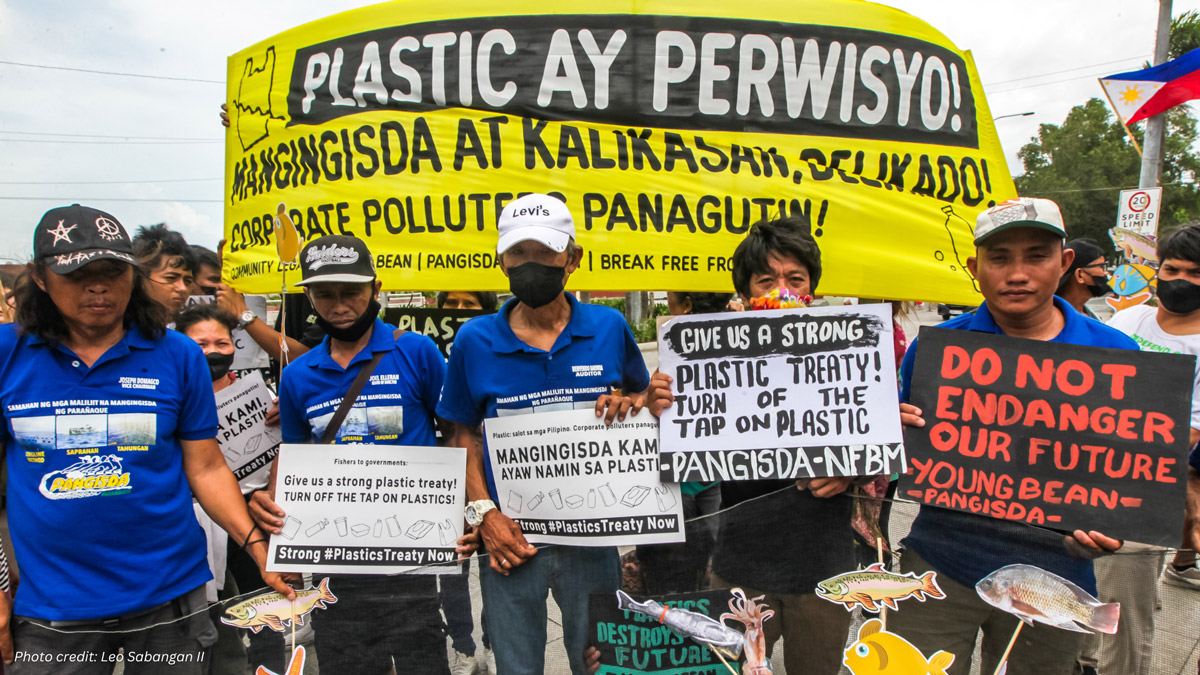Manila — In celebration of National Fisherfolk Day on May 31, 2023, fishing communities and civil society organizations (CSOs) held a creative picket and protest calling on fast moving consumer goods (FMCGs) companies to stop using plastics in their product packaging, especially sachets. The groups, led by PANGISDA Pilipinas—a national organization of small-scale fisherfolk—also asked government delegates currently gathered in Paris, France, including representatives from the Philippines, to adopt a strong global plastics treaty—a legally binding instrument to end plastic pollution.
Carrying placards and streamers, the groups said that plastics are polluting mangroves, consequently destroying fishing grounds and marine habitats. PANGISDA Pilipinas said that plastics wrap around propellers and damage fishing boats. They added, fish feed on microplastics and the capture fisheries continue to decline mainly due to habitat loss triggered by massive habitat destruction aggravated by plastic pollution.
As part of the creative protest, a fisher brought a fish net with plastic waste, an effective visual capturing the sentiment of fishers who often catch plastic waste instead of fish.

Photo credit: Leo Sabangan II
“Nakikiisa ang mga mangingisdang Pilipino sa pagkakaroon ng isang mabisang global plastics treaty na naglalayong ipagbawal ang mga plastik tulad ng sachet. Mapinsala ang mga ganitong uri ng plastik sa aming kabuhayan, sa kalusugan, at sa kalikasan,” (Filipino fishers are united in having a legally-binding global plastics treaty that seeks to phase out single-use plastics such as sachets. Single-use plastics are harmful to our livelihood, human health, and the environment) said Pablo Rosales, Chairman of PANGISDA Pilipinas. “Pabigat din sa kaban ng bayan ang pangongolekta at paglilinis nito dahil walang ligtas na paraan para ma-recycle ang sachet at iba pang uri ng plastik, kaya't nananawagan kami na tanggalin na ito sa merkado.” (Collection and handling of plastics are nothing but a costly burden on government coffers, because there are no safe recycling options for such materials. That's why we're calling to have sachets and other single-use plastics removed from the market.)
Hundreds and thousands of tons of plastic can be found in swirling convergences that make up about 40 percent of the world's ocean surfaces. According to the Ellen MacArthur Foundation, plastic waste are likely to outweigh all fish in the sea by 2050 if no significant action is taken.
In November 2022, Rosales and 31 concerned Filipino consumers went to the Department of Trade and Industry (DTI) head office and filed landmark consumer cases before the Fair Trade Enforcement Bureau - Mediation and Adjudication Bureau against seven companies for using dangerous plastic packaging and rolling out false or misleading advertisements on plastic recyclability. The ongoing cases against Coca-Cola, Pepsi-Cola, Nestle, Unilever, Colgate-Palmolive and Universal Robina Corp. puts to test the sincerity of the government, as well as the good corporate citizenship of these companies, to mend their ways and heed the consumer demand for accountability. Meanwhile, negotiations for a compromise agreement are ongoing between the consumer complainants and Procter & Gamble representatives, following a successful mediation six months ago.
“Single-use plastics are not safe, and not recyclable,” said Enrique Beren, a youth complainant in the cases filed in DTI. “Manufacturers are also being dishonest by using recycling labels and chasing-arrow symbols in their product packaging even though there are no safe plastic recycling options anywhere in the world. Why they are in the ocean in the first place is already a smack to their deceitful advertisements.”
The Social Weather Stations (SWS) found that the majority of Filipino consumers are confused with recycling labels used in plastic packaging, validating concerns raised in the consumer rights complaint. In a March 2023 survey, more than half of 1,200 respondents, or 54%, mistook the Tidyman logo as a recycling label. The Tidyman logo is often associated with ‘don’t litter’ or ‘dispose properly’ reminders, and is not considered as a recycling symbol. Meanwhile, only a fraction of respondents correctly associated recycling logos with recycling. Thirty-five percent said the Mobius Loop symbol refers to recycling, while 18 percent said ‘'Recycle'', ''Recycle Me'', and ''Recyclable'' words indicate recycling.
“Corporations, including those named in the consumer rights complaint, are shoving their responsibility of addressing the plastic pollution problem to consumers and even local governments, knowing that existing waste management infrastructure are inadequate to safely handle sachets and other plastic discards,” said Miko Aliño, project coordinator for corporate accountability of the Break Free From Plastic Movement. “Worse, they are peddling unproven and harmful false solutions such as chemical recycling and plastic burning in cement kilns, instead of adopting reuse-based and packaging-free business models.”

Photo credit: Leo Sabangan II
Elsewhere, the U.S. Environmental Protection Agency (EPA) has recommended removing the ‘chasing arrows’ recycling symbol to address consumer confusion on what types of plastic can be recycled. The recommendation is part of EPA comments related to the U.S. Federal Trade Commission’s proposed rule “Guides for the Use of Environmental Marketing Claims,” which seeks to prevent greenwashing claims in advertising and support reliable sustainability claims. According to the Organization for Economic Cooperation and Development, only 9% of plastic waste was recycled in 2019, while almost 70% were either landfilled or incinerated.
“Recent studies have shown that there is no such thing as safe recycling,” said Greenpeace Philippines campaigner Marian Ledesma, who is attending the ongoing UN plastics treaty negotiations. “Recycling actually increases the toxicity of plastics, posing a threat to the health of consumers, frontline communities, and workers in the recycling sector. This is why the Global Plastics Treaty negotiations must focus on capping and then phasing down plastic production.”
At least 175 countries are now in Paris for the second of the five-part negotiations (International Negotiating Committee—INC-2) for the drafting of the global plastic treaty. The global plastics treaty that is expected to be adopted by 2025 will cover measures to address pollution throughout the existence of plastic, from extraction to remediation. The negotiations followed the United Nations approval of an agreement to create a global plastics treaty— the world's first legally binding document to end plastic pollution— adopted at the conclusion of the fifth United Nations Environment Assembly (UNEA 5.2) in March 2022.
Media Contacts:
- Manny Calonzo, EcoWaste Coalition - info@ecowastecoalition.org
- Eah Antonio, Break Free From Plastic - eah@breakfreefromplastic.org; +639278277960




